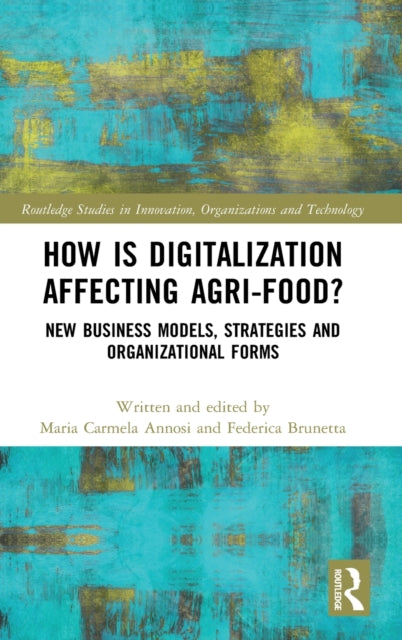Shulph Ink
How is Digitalization Affecting Agri-food?: New Business Models, Strategies and Organizational Forms
How is Digitalization Affecting Agri-food?: New Business Models, Strategies and Organizational Forms
YOU SAVE £6.96
- Condition: Brand new
- UK Delivery times: Usually arrives within 2 - 3 working days
- UK Shipping: Fee starts at £2.39. Subject to product weight & dimension
Bulk ordering. Want 15 or more copies? Get a personalised quote and bigger discounts. Learn more about bulk orders.
Couldn't load pickup availability
- More about How is Digitalization Affecting Agri-food?: New Business Models, Strategies and Organizational Forms
Digitalization is significantly impacting the agri-food industry, leading to the development of new business models, strategies, and organizational forms. This book aims to understand these changes by examining case studies of food firms and agriculture supply chains. It is written for academics, practitioners, and managers in the industry, providing valuable insights into the future of food organizing and organizations.
Format: Hardback
Length: 134 pages
Publication date: 30 October 2020
Publisher: Taylor & Francis Ltd
The impact of digitalization and information technologies on the agri-food industry is a complex and multifaceted issue that requires a comprehensive analysis. Despite the importance of food and agriculture in the current political and societal context, research on the impact of digitalization and information technologies on the industry is still limited. This monograph aims to understand the direction
direction of this change and explore the key themes in strategic and organizational research in this area.
Case studies of food firms and agriculture supply chains are used to conceptualize food organizing and organizations as a fruitful object of inquiry, both at the intra and interorganizational levels. The objective of this research is to understand new business models, strategies, and organizational forms that can emerge in the agri-food industry as a result of digitalization.
Contributions in this stream of research have the potential to yield important and relevant insights for both scholars and societies. This book is written primarily for academics engaged in innovation management or strategy, or conducting organizational behavior research. It will also be of relevance to practitioners and managers in the agri-food industry.
Digitalization is transforming the agri-food industry by introducing new business models, strategies, and organizational forms. One of the key trends is the increasing use of technology to improve efficiency and productivity in the supply chain. This includes the use of artificial intelligence, blockchain, and the Internet of Things (IoT) to track and manage food production, distribution, and consumption.
Another trend is the growing emphasis on sustainability and environmental responsibility in the agri-food industry. Digitalization can help farmers and food firms reduce their environmental footprint by improving the efficiency of their operations, reducing waste, and promoting sustainable practices.
Digitalization is also changing the way consumers interact with food and agriculture. Consumers are increasingly demanding more transparency and information about the food they consume, and digitalization can help food firms provide this information in a more accessible and convenient way. This includes the use of mobile apps, online platforms, and social media to connect consumers with farmers and food producers.
However, digitalization also presents challenges for the agri-food industry. One of the biggest challenges is the need to invest in technology and infrastructure to adopt digital solutions. This can be expensive and time-consuming, and it may require food firms to reevaluate their business models and strategies.
Another challenge is the potential for digitalization to exacerbate existing inequalities in the agri-food industry. For example, small-scale farmers and food producers may struggle to adopt digital technologies, which could put them at a competitive disadvantage compared to larger firms.
To address these challenges, the agri-food industry needs to adopt a collaborative and interdisciplinary approach. This includes working with policymakers, technology companies, and other stakeholders to develop policies and regulations that promote digitalization while also addressing the needs of small-scale farmers and food producers.
In conclusion, digitalization is transforming the agri-food industry by introducing new business models, strategies, and organizational forms. While there are many benefits to digitalization, there are also challenges that need to be addressed. By adopting a collaborative and interdisciplinary approach, the agri-food industry can harness the potential of digitalization to improve efficiency, sustainability, and consumer engagement while also addressing the needs of small-scale farmers and food producers.
Weight: 374g
Dimension: 161 x 242 x 10 (mm)
ISBN-13: 9780367196516
This item can be found in:
UK and International shipping information
UK and International shipping information
UK Delivery and returns information:
- Delivery within 2 - 3 days when ordering in the UK.
- Shipping fee for UK customers from £2.39. Fully tracked shipping service available.
- Returns policy: Return within 30 days of receipt for full refund.
International deliveries:
Shulph Ink now ships to Australia, Belgium, Canada, France, Germany, Ireland, Italy, India, Luxembourg Saudi Arabia, Singapore, Spain, Netherlands, New Zealand, United Arab Emirates, United States of America.
- Delivery times: within 5 - 10 days for international orders.
- Shipping fee: charges vary for overseas orders. Only tracked services are available for most international orders. Some countries have untracked shipping options.
- Customs charges: If ordering to addresses outside the United Kingdom, you may or may not incur additional customs and duties fees during local delivery.


